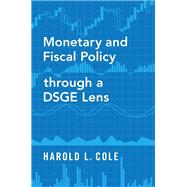Monetary and Fiscal Policy Through a Dsge Lens
, by Cole, Harold L.- ISBN: 9780190076047 | 0190076046
- Cover: Paperback
- Copyright: 5/6/2020
In Monetary and Fiscal Policy Through a DSGE Lens, Harold L. Cole develops and extends versions of a classic quantitative model of economic growth to take on a wide range of topics in monetary and fiscal policy. Bridging the gap between current undergraduate and graduate texts in the field, this comprehensive book covers the basic elements of advanced macroeconomics and equips readers to understand the debate on key policy questions.
By using the simple DSGE, or dynamic stochastic general equilibrium, framework to build a series of quantitative models, the book combines a gradual introduction to advanced analytic methods with computer programming and quantitative policy analysis. In a clear discussion of the sophisticated interaction between theory and data, Cole explains how to gauge how well a model captures key elements in the data and how to reverse engineer a model to data. The book covers costs of inflation, optimal monetary policy, the impact of labor and capital taxes, and optimal fiscal policy. It systematically discusses technical material including the new Keynesian liquidity shock models, standard analytic methods, such as Lagrangian methods, and computational methods using Matlab and Python. With a strong computational emphasis, the volume teaches how to program up and solve systems of non-linear equations and develop models to study the macroeconomy.
Knowing how to deeply understand and analyze models and develop computational code to evaluate the implications of those models is essential for students of macroeconomics. This book connects the standard undergraduate material to the elaborate models of advanced graduate courses with systematic and logical coverage of the basics of advanced modern macroeconomics.
By using the simple DSGE, or dynamic stochastic general equilibrium, framework to build a series of quantitative models, the book combines a gradual introduction to advanced analytic methods with computer programming and quantitative policy analysis. In a clear discussion of the sophisticated interaction between theory and data, Cole explains how to gauge how well a model captures key elements in the data and how to reverse engineer a model to data. The book covers costs of inflation, optimal monetary policy, the impact of labor and capital taxes, and optimal fiscal policy. It systematically discusses technical material including the new Keynesian liquidity shock models, standard analytic methods, such as Lagrangian methods, and computational methods using Matlab and Python. With a strong computational emphasis, the volume teaches how to program up and solve systems of non-linear equations and develop models to study the macroeconomy.
Knowing how to deeply understand and analyze models and develop computational code to evaluate the implications of those models is essential for students of macroeconomics. This book connects the standard undergraduate material to the elaborate models of advanced graduate courses with systematic and logical coverage of the basics of advanced modern macroeconomics.







